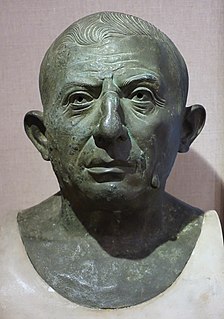Related Research Articles

The gens Rabiria was a minor plebeian family at Ancient Rome. Although of senatorial rank, few members of this gens appear in history, and the only one known to have held any of the higher offices of the Roman state was Gaius Rabirius Postumus, who was praetor circa 48 or 47 BC.
The gens Acilia was a plebeian family at ancient Rome, that flourished from the middle of the third century BC until at least the fifth century AD, a period of seven hundred years. The first of the gens to achieve prominence was Gaius Acilius Glabrio, who was quaestor in 203 and tribune of the plebs in 197 BC.
The gens Tullia was a family at ancient Rome, with both patrician and plebeian branches. The first of this gens to obtain the consulship was Manius Tullius Longus in 500 BC, but the most illustrious of the family was Marcus Tullius Cicero, the statesman, orator, and scholar of the first century BC. The earliest of the Tullii who appear in history were patrician, but all of the Tullii mentioned in later times were plebeian, and some of them were descended from freedmen. The English form Tully, often found in older works, especially in reference to Cicero, is now considered antiquated.

The gens Lutatia, occasionally written Luctatia, was a plebeian family of ancient Rome. The first of the gens to obtain the consulship was Gaius Lutatius Catulus in 242 BC, the final year of the First Punic War. Orosius mentions their burial place, the sepulchrum Lutatiorum, which lay beyond the Tiber.

The gens Vibia was a plebeian family at ancient Rome. Although individuals named Vibius appear in history during the time of the Second Punic War, no members of this gens are found at Rome until the final century of the Republic. The first of the Vibii to obtain the consulship was Gaius Vibius Pansa in 43 BC, and from then until imperial times the Vibii regularly filled the highest offices of the Roman state. The emperors Trebonianus Gallus and Volusianus each claimed descent from the family.
The gens Appuleia, occasionally written Apuleia, was a plebeian family at ancient Rome, which flourished from the fifth century BC into imperial times. The first of the gens to achieve importance was Lucius Appuleius, tribune of the plebs in 391 BC.

The gens Caecilia was a plebeian family at Rome. Members of this gens are mentioned in history as early as the fifth century BC, but the first of the Caecilii who obtained the consulship was Lucius Caecilius Metellus Denter, in 284 BC. The Caecilii Metelli were one of the most powerful families of the late Republic, from the decades before the First Punic War down to the time of Augustus.
The gens Caelia was a plebeian family at ancient Rome. The nomen Caelius is frequently confounded with Coelius and Caecilius, with some individuals referred to as Caelius in manuscripts, while appearing as Coelius or Coilius on coins. Although the Caelii asserted their great antiquity, none of them attained any of the higher offices of the Roman state until the praetorship of Publius Caelius in 74 BC, and the first of this gens who obtained the consulship was Gaius Caelius Rufus in AD 17. The emperor Balbinus was a descendant of the Caelii.
The gens Titia was a plebeian family at ancient Rome. The gens is rarely mentioned in the Republican period, and did not rise out of obscurity till a very late time. None of its members obtained the consulship under the Republic, and the first person of the name who held this office was Marcus Titius in BC 31.
The gens Sextilia was a plebeian family at Rome. The first member of this gens to achieve prominence was Gaius Sextilius, consular tribune in 379 BC. None of the family obtained the consulship, but they endured throughout Roman history from the early Republic into imperial times.
The gens Fadia was a plebeian family at Rome. Members of this gens are first mentioned around the time of Cicero, but they did not obtain any of the higher offices of the Roman state under the Republic. Their fortunes improved under the Empire, and two of the Fadii held consulships during the second century.

The gens Curtia was an ancient but minor noble family at Rome, with both patrician and plebeian branches. The only member of the gens invested with the consulship under the Republic was Gaius Curtius Philo, in 445 BC. A few Curtii held lesser magistracies during the Republic, and there were two consuls suffectus in imperial times. However, the gens is best remembered from a series of legends dating from the traditional founding of the city to the early Republic.
The gens Egnatia was a plebeian family of equestrian rank at Rome. Only a few of the Egnatii held any magistracies, of whom the most important may have been Gnaeus Egnatius, who held the praetorship during the second century BC, and served as governor of Macedonia, shortly after its institution as a Roman province.

The gens Fonteia was a plebeian family at Rome. Members of this gens are first mentioned toward the end of the third century BC; Titus Fonteius was a legate of Publius Cornelius Scipio during the Second Punic War. The first of the Fonteii to obtain the consulship was Gaius Fonteius Capito, consul suffectus in 33 BC.

The gens Sosia, occasionally written Sossia, was a plebeian family at ancient Rome. Members of this gens occur in history from the end of the Republic down to the third century AD. The first of the Sosii to attain the consulship was Gaius Sosius in 32 BC, and the family would continue holding various positions in the Roman state until the third century.

The gens Juventia, occasionally written Jubentia, was an ancient plebeian family at Rome. After centuries of obscurity, the gens emerges into history with the appearance of Titus Juventius, a military tribune, in the beginning of the second century BC. The first of the Juventii to obtain the consulship was Marcus Juventius Thalna in BC 163. But the family is renowned less for its statesmen than for its jurists, who flourished during the second century AD.
The gens Luscia was a minor family at ancient Rome. Members of this gens are first mentioned in the early part of the second century BC. They were of senatorial rank, but few of them achieved the higher offices of the Roman state. The only known consul of this gens was Lucius Luscius Ocrea, during the Flavian dynasty.
The gens Oppia was an ancient Roman family, known from the first century of the Republic down to imperial times. The gens may originally have been patrician, as they supplied priestesses to the College of Vestals at a very early date, but all of the Oppii known to history were plebeians. None of them obtained the consulship until imperial times.
The gens Peducaea, occasionally written Paeducaea or Peducea, was a plebeian family at ancient Rome. Members of this gens occur in history from the end of the second century BC, and from then to the time of Antoninus Pius, they steadily increased in prominence. The first of the Peducaii to obtain the consulship was Titus Peducaeus in 35 BC.

The gens Saufeia was a minor plebeian family at ancient Rome. Members of this gens are first mentioned in the final century of the Republic, and from then to the early Empire their name occurs regularly in history, but none of them ever attained the consulship.
References
- 1 2 Dictionary of Greek and Roman Biography and Mythology , William Smith, Editor.
- ↑ Gaius Plinius Secundus, Historia Naturalis , vii. 15.
- ↑ Titus Livius, Ab Urbe Condita , xxxii. 7.
- ↑ Marcus Tullius Cicero, De Oratore , i. 39, 56, 57, ii. 6, 32, 54; Brutus 39, 52, 53, 73, 88; Pro Caecina, 18; Topica, 10.
- ↑ Marcus Tullius Cicero, Epistulae ad Familiares, xiii. 49; Post Reditum in Senatu , 8.
- ↑ Marcus Tullius Cicero, Epistulae ad Familiares, vii. 23-26, viii. 5, 6, xiii. 7, 17, 50, xvi. 4, 5, 9, 11; Epistulae ad Atticum, vii. 2, 3, xvi. 3.
- ↑ Marcus Tullius Cicero, Philippicae , v. 5, viii. 9.
- ↑ Marcus Tullius Cicero, Pro Gaio Rabirio Perduellionis Reo, 3; Pro Gaio Rabirio Postumo, 2, 17.
- ↑ Marcus Tullius Cicero, Pro Gaio Rabirio Postumo, 2, 17.
- ↑ Marcus Tullius Cicero, De Petitione Consulatus , 3; In Toga Candida , p. 426; Epistulae ad Atticum, i. 1.</
- ↑ Quintus Asconius Pedianus, In Toga Candida , p. 95, ed. Orelli.
- ↑ Gaius Sallustius Crispus, The Conspiracy of Catiline, 17, 23, 26.
- ↑ Appianus, Bellum Civile, ii. 3.
- ↑ Appianus, Bellum Civile, v. 137.
- ↑ Gaius Julius Caesar, Commentarii de Bello Civili , i. 24.
- ↑ Marcus Tullius Cicero, Epistulae ad Atticum, ii. 20, ix. 6.
- ↑ Marcus Fabius Quintilianus, Institutio Oratoria, vi. 3 § 73.
- ↑ Julius Capitolinus, Maximinus et Balbinus, 4.
- ↑ Dictionary of Greek and Roman Biography and Mythology , William Smith, Editor.
![]()
|title= (help)